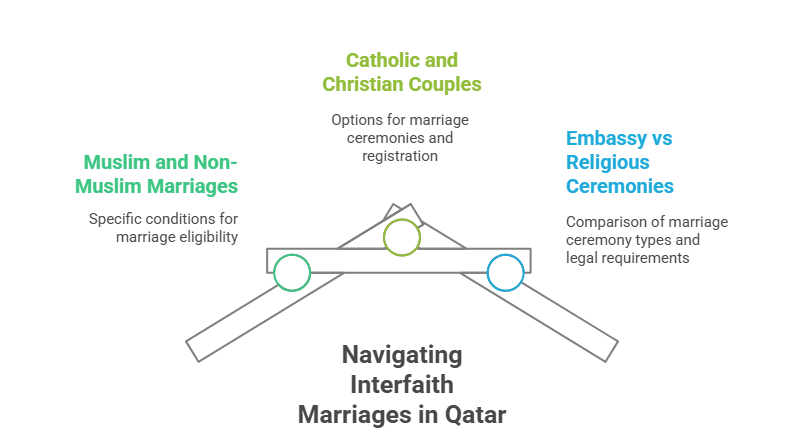
Table of Contents
Introduction
Qatar, a country deeply rooted in Islamic tradition yet equipped with a modern legal system, allows foreigners and residents to marry legally. However, the court marriage process in Qatar differs significantly based on religion, nationality, and marital history. Whether you're an expat, part of a mixed-faith couple, or planning to marry a Qatari national, this guide will help you understand each step to legally marry in Qatar—and ensure global recognition of your union.
Legal Requirements for Court Marriage
Eligibility for Different Types of Couples
List of Documents Required
-
Valid passports with Qatar residence permits (QIDs)
-
Birth certificates
-
Affidavit of single status (or divorce/death certificates if previously married)
-
Medical certificate from a licensed Qatari hospital
-
Two witnesses (with valid QID)
-
No Objection Certificate (NOC) from embassy/consulate (if required)
Conditions Based on Religion
-
Muslim couples must conform to Islamic family law.
-
Non-Muslim couples: An embassy marriage is usually required; however, they may register with the Qatari court.
-
Mixed-faith couples require special attention to religious restrictions and embassy policies.
Preparing Your Marriage Documents
Affidavit of Single Status
This certificate verifies that you are legally free to marry. It must be obtained from your home country's embassy and may require notarization and attestation.
Translation and Notarization Requirements
All non-Arabic documents must be legally translated into Arabic by a certified translation service in Qatar. The translated documents must then be notarized by Qatar’s Ministry of Justice.
Embassy Certifications and Attestations
Embassies may require further certification of documents such as
-
Birth certificate
-
Passport copies
-
Divorce decree or death certificate
-
Single status affidavit
Court Marriage Process in Qatar
Applying at the Family Court in Al Sadd
The Family Court in Al Sadd, Doha, is where most legal marriages take place for Muslim couples or mixed-religion unions permitted by law. Couples must visit the court and submit:
-
Application forms
-
Original and translated documents
-
Marriage affidavit and NOC if required
Booking an Appointment and Required Fees
-
Appointments should be booked in advance.
-
A standard court marriage fee is around QAR 200.
-
Urgent appointments may require an additional fee or legal representation.
Attending the Marriage Ceremony
-
The ceremony is conducted in Arabic.
-
An official translator can be requested if either party doesn’t understand Arabic.
-
Both partners and two witnesses must be physically present.
Receiving the Marriage Certificate
Once the ceremony is complete, the court issues an official Arabic marriage certificate. This certificate can be translated and legalized for international use.
Interfaith and Religious Considerations

Timeline and Processing Duration
Standard vs Urgent Marriage Processing
-
Standard processing: 2 to 4 weeks, including document prep, court scheduling, and marriage hearing.
-
Urgent cases: 1 to 2 weeks, often requires lawyer facilitation.
Cost Breakdown for Court Marriage
-
Court fee: QAR 200–300
-
Translation: QAR 100–300 per document
-
Notarization: QAR 50–100 per document
-
Legal consultation (optional): QAR 500–1000+ depending on case complexity
What to Expect After Filing
-
Delays may occur due to incorrect documentation
-
It's recommended to double-check all embassy rules before applying
-
Register marriage within 30 days if married outside the court
Embassy-Based Marriages
How They Differ from Court Marriages
-
Conducted in your native language
-
Only available to couples of the same nationality (in most embassies)
-
Often do not require Qatar court appearance
Dual Registration Strategy
-
Marry at the embassy and then register at Qatar Family Court
-
Provides legal validity both in Qatar and in your home country
Legal Recognition in Qatar and Abroad
-
Embassy marriage + registration at MOJ ensures recognition
-
Some countries may still require an apostille or local recognition process
.png)
When You Need a Lawyer
How Legal Support Helps Prevent Delays
-
Ensures documentation is correct and complete
-
Translates and certifies legal documents
-
Coordinates with the Family Court and embassy officials
-
Expedites urgent cases with legal authority
Top Law Firms for Court Marriage in Qatar
-
Many law firms in Doha offer family law specialists who handle:
-
Civil and Sharia-based marriage procedures
-
Document preparation and submission
-
Representation in court if required
-
Lawyer Fees and Consultation Tips
-
Fees range from QAR 500 to QAR 2000 depending on complexity
-
Always request a detailed consultation and quote before proceeding
-
Lawyers from Lawyers 974 directory are vetted and experienced in marriage law
Conclusion
Getting legally married in Qatar—whether through the Family Court or via your embassy—requires thorough preparation and cultural understanding. From document attestation and translations to navigating religious laws and court hearings, each step must be carefully planned.
By following the right procedures and seeking professional guidance when needed, you can ensure that your marriage is recognized both in Qatar and internationally.
If you're ready to begin your journey, consult with a qualified legal expert or visit Lawyers 974 to find a trusted marriage lawyer in Qatar today.
Your new life together starts with one informed decision.
Disclaimer: This article provides general information and should not be construed as legal advice. Please consult with a qualified and experienced lawyer for personalized guidance regarding your specific situation.

.png)